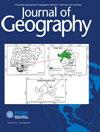职前教师在评估热带雨林教案时如何参考不同的知识领域
IF 1.8
3区 地球科学
Q1 GEOGRAPHY
引用次数: 0
摘要
在初始教师教育(ITE)中,职前教师在不同的知识领域获得陈述性知识:一般教学法、内容和教学内容。为了调查他们如何在与学校相关的情况下使用这些知识,n = 56名职前教师被要求评估同伴的虚构课程计划。对他们的评论进行了内容分析和频率分析,确定了反映不同思维模式的三种不同的集群。参与者主要提到教学知识,以及一些教学内容知识;专门关注内容的评论很少见。本文章由计算机程序翻译,如有差异,请以英文原文为准。
How Preservice Teachers Refer to Different Knowledge Domains When Evaluating a Lesson Plan on the Tropical Rainforest
Abstract In initial teacher education (ITE), preservice teachers acquire declarative knowledge in different knowledge domains: general pedagogy, content, and pedagogical content. To investigate how they use this knowledge in a school-related situation, n = 56 preservice teachers were asked to evaluate a peer's fictitious lesson plan. Their comments were subjected to content analysis and frequency analysis, which identified three distinct clusters reflecting different thought patterns. Participants referred predominantly to pedagogical knowledge, as well as some pedagogical content knowledge; exclusively content-focused comments were rare.
求助全文
通过发布文献求助,成功后即可免费获取论文全文。
去求助
来源期刊

Journal of Geography
GEOGRAPHY-
CiteScore
4.90
自引率
6.50%
发文量
12
期刊介绍:
Journal of Geography is the journal of the National Council for Geographic Education. The Journal of Geography provides a forum to present innovative approaches to geography research, teaching, and learning. The Journal publishes articles on the results of research, instructional approaches, and book reviews.
 求助内容:
求助内容: 应助结果提醒方式:
应助结果提醒方式:


